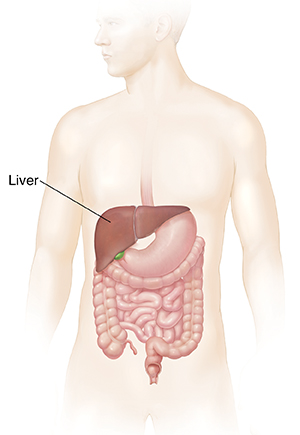Understanding a Bruised Liver
A bruise (contusion) is a type of injury. It occurs when small blood vessels break open and leak blood into nearby tissues. The liver is a large organ in the upper right part of the belly (abdomen). It sits under the right ribs. It can become bruised after an injury to the area.

What causes a bruised liver?
Common causes of a bruised liver include:
What are the symptoms of a bruised liver?
You may feel pain and tenderness in the upper right part of your belly. You may also feel pain under your right ribs, in the right side of your chest, or your right shoulder. In some cases, you may have bruised skin over the injured area. The belly can swell. In severe cases, with ongoing bleeding, symptoms of shock can develop. These include decreased alertness and low blood pressure.
What is the treatment for a bruised liver?
Treatment for a bruised liver depends on how severe the injury is. Many cases can often be managed without surgery. But you still need to be seen. You may need:
-
Close watching in the hospital.
-
Bed rest and IV (intravenous) fluids.
-
Tests to check for blood loss and other injuries.
-
Blood transfusions.
-
Imaging tests, such as a CT scan, to look at the internal organs .
For a minor bruise
For a minor bruise with little blood loss, you may be discharged from the hospital within a few days. Home care may involve further rest. You may also need to stop some activities until your liver heals. You may also need follow-up care with your health care provider.
For a severe case
For severe blood loss or if other injuries are involved, you may need a procedure or surgery. These may be used to:
-
Drain excess fluids or blood from your belly.
-
Find and stop the source of bleeding in your liver or belly.
-
Fix damage to your liver and other injuries as needed.
Possible complications of a bruised liver
These can include:
-
Severe blood loss, which can lead to shock.
-
Infection.
-
Problems with the pathways (bile ducts) that carry bile from the liver to nearby organs.
-
Abdominal compartment syndrome. This occurs when pressure in the belly is higher than normal.
-
Death.
Call 911
Call 911 right away if you have signs of shock. These include:
-
Pale skin.
-
Rapid pulse.
-
Shallow breathing.
-
Dizziness.
-
Fainting.
-
Confusion.
When to contact your doctor
Contact your health care provider or seek medical care right away if you have any of these:
-
Fever of 100.4°F (38°C) or higher, or as directed by your provider
-
Symptoms that don’t get better with treatment, or get worse
-
Yellowish skin or eyes (jaundice)
-
New symptoms